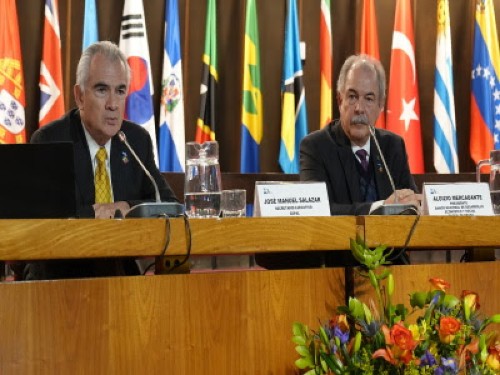SANTIAGO, Chile – President of the Brazilian Development Bank (BNDES), Aloizio Mercadante, says Latin America and the Caribbean must act with “courage” to reactivate and accelerate regional integration, putting the focus on the necessary decarbonization of the region’s economies to tackle the severe climate crisis.
 Delivering a lecture to commemorate 75th anniversary of the Economic Commissioner o for Latin America and the Caribbean (ECLAC), Mercadante said “we are facing a major geopolitical shift, a polarization between East and West, between the United States and China.
Delivering a lecture to commemorate 75th anniversary of the Economic Commissioner o for Latin America and the Caribbean (ECLAC), Mercadante said “we are facing a major geopolitical shift, a polarization between East and West, between the United States and China.
“The region, in this scenario, must continue to actively pursue a multipolar world. Latin America needs to build bridges, pursuing interactions among the countries of the Global South,” said Mercadante.
In his presentation, Mercadante reviewed the pillars of the Brazilian government’s current economic policy, which include a new industrial policy, a program to accelerate growth and the ecological transformation, which he described as initiatives for moving towards a green, decarbonized economy.
“This is part of a historic effort. Brazil is living through a new time and it is very positive, but this only makes sense if it is shared with the other countries of Latin America and the Caribbean.
“Together we have greater diplomatic presence and a bigger, more powerful consumer market. But the integration agenda must be revised,” he said, adding “we must integrate the region’s value chains, generate partnerships between companies. We need to intensify infrastructure to accelerate the region’s economic and trade integration.
“Our challenge in the region is not to replace the commodities we export, but instead to create value added.”
In his remarks, the The Brazilian economist also recognized ECLAC’s historical contributions and expressed confidence that the United Nations regional organization can support the region on the numerous challenges it faces today.
“ECLAC has always been a crucial, structuralist and innovative point of reference on development, combining economic development and the fight against inequality in our region,” he said.
ECLAC’s executive secretary, José Manuel Salazar-Xirinachs, thanked Mercadante for participating in the Keynote Lecture Series, highlighting the long and fruitful relationship between ECLAC and the BNDES, recalling the importance of influential Brazilian economist Celso Furtado.
“Celso Furtado, who would have turned 103 this year, was one of the founders of what is known as the ECLAC school of thought on Latin America and the Caribbean’s development, and he also formed part of the BNDES as a director in the 1950s,” Salazar-Xirinachs said.
ECLAC and BNDES have signed a memorandum of understanding that, among other things, formalizes the creation of a new joint Working Group, named after Celso Furtado, with the aim of promoting academic research, the publication of studies, and training on key issues for the development of the Brazilian, Latin American and Caribbean economies.
“This Working Group recovers, 70 years later, a historical framework for action and initiatives for economic development, with the new challenges and complexities that the 21st century poses for creating a more productive, inclusive and sustainable future,” Salazar-Xirinachs explained.
“Brazil and the countries of Latin America and the Caribbean are at a crossroads: despite these countries’ enormous potential, growth rates in the last decade have been very low, creating an environment in which the structural gaps in development tend to worsen.”
“The big push that we must make on multiple fronts – productive, social, environmental, digital, educational and on the care society – to transform our development models requires scaling up financing, and few institutions in the world have as much experience with this issue as the BNDES,” Salazar-Xirinachs said.


